Flight Centre CEO Graham Skroo Turner blasts governments for ‘destroying lives and livelihoods’
This is the moment Graham “Skroo” Turner’s Brisbane-based global travel behemoth went into a death spiral as borders closed, forcing 15,000 staff to be laid off.
News
Don't miss out on the headlines from News. Followed categories will be added to My News.
‘What the f--k’s going on?”
It’s the mischievous and disarming gambit for which Graham “Skroo” Turner is renowned, whether it’s walking into a business meeting or catching up with old mates.
It was also a question he was asking quite literally (along with the rest of the world) in early 2020 as Covid threatened to bring down the travel empire he’d spent decades building.
Now, as he celebrates the 50th anniversary of what would become Brisbane-based global travel behemoth Flight Centre, Turner and his company are again flying high.
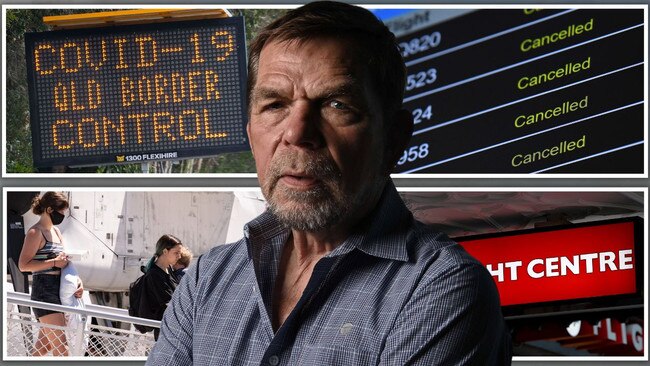
But the 74-year-old former vet turned travel tycoon, with a no-frills penchant for short-sleeved business shirts, has lost none of his appetite for letting fly at state and federal governments for everything from their “totally over the top” Covid response to the controversial decision to block Qatar Airways from expanding its Australian services amid sky-high overseas airfares.
Flight Centre began not with the roar of a jet plane but the rumble of an old London double-decker bus.
It was October 1973 and a scruffy-bearded young “Skroo” (a nickname derived from the Turner screwdriver brand) was in the UK working as a vet after graduating from the University of Queensland two years previously.
Raised in Stanthorpe – the middle child and only son of apple orchardists Frank and Iris Turner – he’d attended Toowoomba Grammar before studying veterinary science at UQ. A working stint in Victoria followed, before he and mates made the pilgrimage to Europe, where Turner worked as a locum vet in the UK.
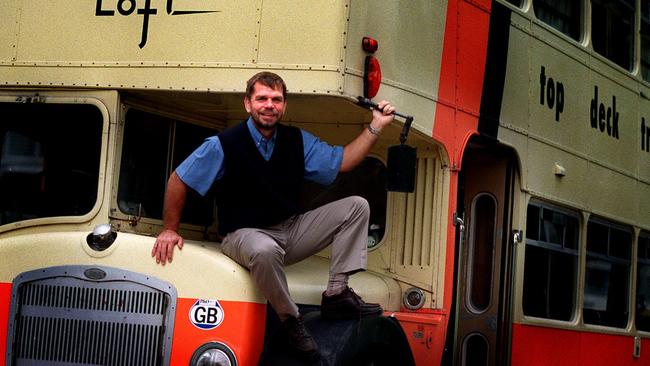
He was on his way to attend to a horse near Leeds, in the northern English county of Yorkshire, when he spotted a field full of buses.
“I was with a student vet and we came across this old WWII airfield and there were hundreds – probably 200 to 300 – old double-decker council buses there, one of which had been fitted out and priced at £650,” Turner recalls.
“We’d been travelling around Europe since the Munich Olympics for a few months and we’d seen some of these deckers fitted out.
“A week or two later I went with some of my mates to the Munich Oktoberfest. One of my vet mates, Geoff ‘Spy’ Lomas, and I were having a few steins and after he had three or four, he agreed to come in 50/50 with me to buy one.
“I went back to London, bought the bus and we left in early November ’73 for the first (paying customer) trip to Spain, Portugal and Morocco.”

Turner is speaking with Qweekend in the rooftop staff bar of Flight Centre Travel Group’s corporate headquarters in the Southpoint building, overlooking South Bank.
It’s the building where, in March 2020, Turner was forced to establish a “war room” in which he and his lieutenants drew up battle plans to save Flight Centre as the pandemic sent the publicly-listed company into a tailspin that came perilously close to becoming a death spiral.
It’s a warm and sunny public holiday in Brisbane but casually-dressed staffers are still swiping in and out of the building that also serves as Virgin Australia’s HQ.
Turner is meeting us after lunch with wife Jude – his partner of almost four decades – where he admits to having “a few limoncellos”.
“Good to see people are still having a good time,” Turner says, nodding approvingly towards a table full of empty beer bottles in the deserted bar – the detritus of some long weekend employee drinks.
The “sky bar” is part of the fun workplace culture Turner has sought to instil at Flight Centre, whose Southpoint offices boast a staff slippery slide between the 14th and 12th floors; a gym; and plane, train and double-decker bus-themed meeting rooms.
The flash fit-out, which cost a reported $25m, is a world away from Flight Centre’s humble beginnings with that first London bus.
“Originally, we were just trying to get just our friends to go and have a good time,” Turner says of that maiden bus tour.
“Of course, friends agree and then don’t come through with their shared costs. We thought, no, let’s run a (commercial) trip.”
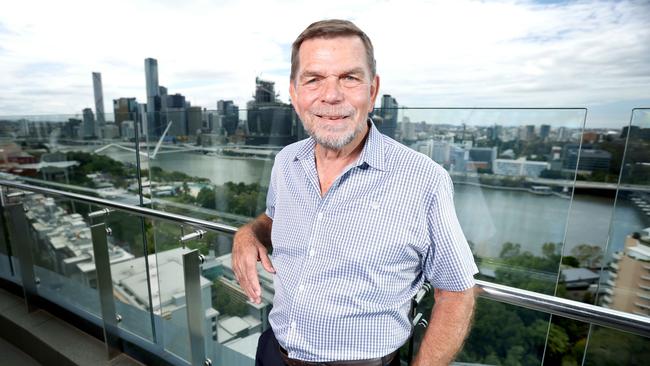
London was full of Aussie expats at the time and Turner and Lomas placed ads in fortnightly newspaper the Australasian Express to lure their first customers.
“All our (European tour) competition was camping – you had to put your tents up every night. And they had a camping trailer and kitchen,” he says. “What we were offering was quite different, because we slept on the bus and had the kitchen on the bus.
“We went from one bus in ’73 to three or four in ’74 to, I think seven or eight in ’75. By ’80 or ’81, I think we had about 17 double-deckers running around, taking Aussies, South Africans and Kiwis on trips around Europe. In ’75, we did our first overland trip from London to Kathmandu, with me at the wheel.”
One of the first passengers, schoolteacher Bill James, enjoyed the experience so much he came on board as a partner, tipping in his £600 life savings to buy a second bus.
The fledgling travel company was initially called Argas Persicus, the scientific name for a fowl tick and something of an in joke between young vets Turner and Lomas.
“When people kept asking us if we were a Greek company, we knew it was probably time to look for a name change,” Turner says.
Over beers in a pub, a couple of friends told Turner and Lomas: “You sleep on the top deck of the bus so why not call it Top Deck?”
The company is still operating, as Topdeck Travel – running luxury coach tours worldwide for 18-35-year-olds, in competition with Contiki. It’s now a subsidiary of Flight Centre, which bought it back in 2015 after a series of ownership changes and even a collapse.
Flight Centre launched in 1982 after Skroo and Jude – who was then pregnant with their first child, Matt (daughter Jo followed) – had returned to Australia to run Top Deck’s booming business Down Under.
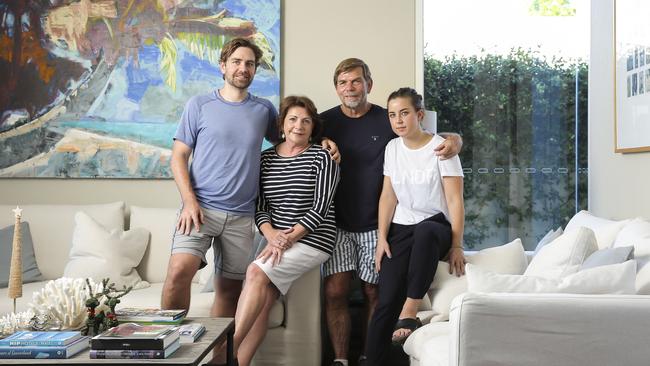
Former Top Deck staffer David Tonkin approached Turner with the idea of setting up a travel agency based on “bucket-shop” airfare discounters that were thriving in Europe.
The first Flight Centre retail outlet opened in Sydney in 1982, making a reported $100,000 profit in its first year.
Lomas, who had left Top Deck, was lured back to open Flight Centre’s first Brisbane shop, while a young sales and advertising executive named Geoff Harris set up the agency’s Melbourne operation and later became a partner in the business.
“We could see there was a great opportunity here because in 1981, it was illegal to sell discount airfares in Australia,” Turner says.
“Our slogan was ‘discount airfare specialists’. A lot of travel agents got prosecuted but we didn’t. We managed to escape it. The government changed the rules in about 1984 (to allow discounting), and we were just there at the right time with something different.
“The travel industry tried to fight us – AFTA (Australian Federation of Travel Agents) convinced the (federal) government to set up this travel compensation fund which they thought would put us out of business, but it didn’t. We just grew stronger and stronger through the ’90s.
“The TCF, as it was called, was a pain in the arse to everyone and eventually the industry got rid of it. It put a bit of pressure on people like us who were growing rapidly because you had to have a certain amount in capitalisation in basically a trust account, a bit like real estate agents. Over the years when it was operating, Flight Centre paid out a lot of money in fees to the TCF to support other travel agents that went broke. We subsidised over that 20 years about $50m to get agencies which weren’t viable to survive.”
By the end of the 1980s, Flight Centre had 345 staff in 63 shops in Australia, the UK and NZ, having unleashed its trademark airline captain advertising ambassador and catchy “lowest airfares guaranteed” jingle in 1984.
The company started selling domestic holidays in 1991 following the Gulf War which had scared people off overseas travel. By 1995, its profit eclipsed $10m and it was listed on the Australian Stock Exchange.
By the end of the 2000s – despite shocks including 9/11, the collapse of Ansett Airlines, the Iraq War and the GFC – Flight Centre had grown to 400 outlets and more than 3000 staff. Reflects Turner: “Events like 9/11 were tough for a month or two and in the case of the GFC, for a year or two – but they were nothing like Covid.”
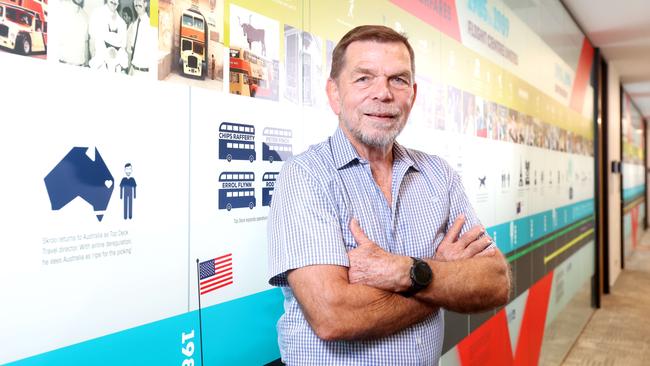
Turner remembers in January 2020 hearing about “a virus in China … and we weren’t too worried about it”.
But as the pandemic gathered momentum, he returned from a trip to London in March to widespread panic.
“We realised bloody (then-prime minister Scott) Morrison was going to shut the borders and we were in a battle to survive,” he says.
“So we set up a war room (on the top floor of Southpoint) and were stuck in there for the next two or three months trying to raise money. We went from an income of $250m a month to nothing. We had at the time about $1.3bn in cash but we knew we needed a lot more than that.
“Our outgoings were $225m a month, our income went to nothing overnight because of the government, and we realised we only had three or four or five months at best if we couldn’t raise money and cut expenses dramatically.”
Turner says he thought Covid and its crippling restrictions would run for a month or two, not three years. “My judgment was pretty shithouse,” he says.
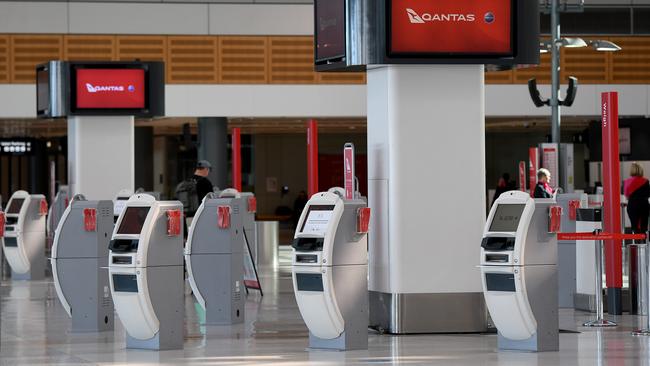
“We just knew we had to have a positive attitude, we had to accept that it would take a lot of serious actions to survive.”
But survive the company did, with Turner and his fellow executives working day and night to raise sufficient capital to stay afloat. Tears flowed at Southpoint as about 15,000 staff worldwide – many long-termers and friends of the executive team – were laid off in a bid to slash costs to $60m a month.
“The government restrictions were all so pointless in the end; they didn’t achieve anything,” Turner says.
“It may have slowed the spread minutely, but as we know now, it was a dramatic overreaction.
“Sweden probably ended up best in terms of the deaths and they didn’t panic. Australia and New Zealand panicked worse than just about any other country in the world. The US and UK, people there generally will tell the government to get f--ked. They won’t obey the rules, whereas Australians and New Zealanders are really rule obeyers and governments took advantage of that, particularly the states. You can’t blame the politicians because politics is all about getting re-elected. You can blame the medical people who should have known better, because this is not difficult stuff. You know shutting down schools is not going to help – you know that 99.9 per cent of people aren’t vulnerable to Covid. That became obvious pretty quickly. The over 80s and people with severe immune problems were the only ones that were in danger. But (governments) just ignored all the evidence and the science and it destroyed lives and livelihoods.”
Turner is similarly angry at the Albanesegovernment over what he calls the “Qatar fiasco” – the federal government’s decision earlier this year to reject Qatar Airways’ application for extra flights into Australia, including Brisbane.
In September, he personally fronted a Senate inquiry to condemn the decision and call for more “open skies” agreements to boost capacity and competition and bring down sky-high international airfares.
“It was unfathomable what the government did in rejecting Qatar – it’s like it’s a government for high airfares. We’re still trying to get to the bottom of why they did that,” he says.
Turner says international travel bounced back from Covid quicker than most people expected but seat capacity, especially to and from Europe, is still too low: “We’ll get a lot more tourists if we’ve got better capacity which will also mean lower airfares.”
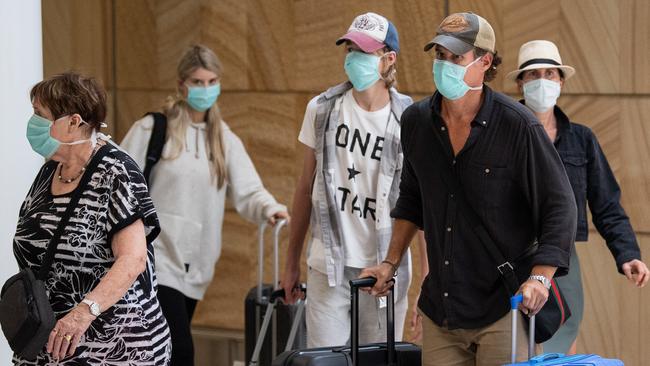
Flight Centre rebounded strongly last financial year, recording a $106m profit before tax, after posting a $361m loss the previous year. Total sales were a staggering $22bn.
The company now has about 14,000 staff in 26 countries, down from the 22,000 or so pre-Covid. But Turner, whose family also founded and has retained stakes in Spicers Retreats and 99 Bikes, says “less people intensive” corporate travel is now making a much bigger contribution to the Flight Centre business.
“In the five years it will take us to get back to pre-Covid levels, we will have lost $3.3bn,” he says.
“It’s a credit to our people who went through the pain and rose to the challenge for where we are now. The main thing is getting Flight Centre Travel Group back to where we know it needs to be and should be. There are plenty of challenges ahead, but also plenty of opportunities.”
A bit like that first bus trip.
More Coverage
Originally published as Flight Centre CEO Graham Skroo Turner blasts governments for ‘destroying lives and livelihoods’





